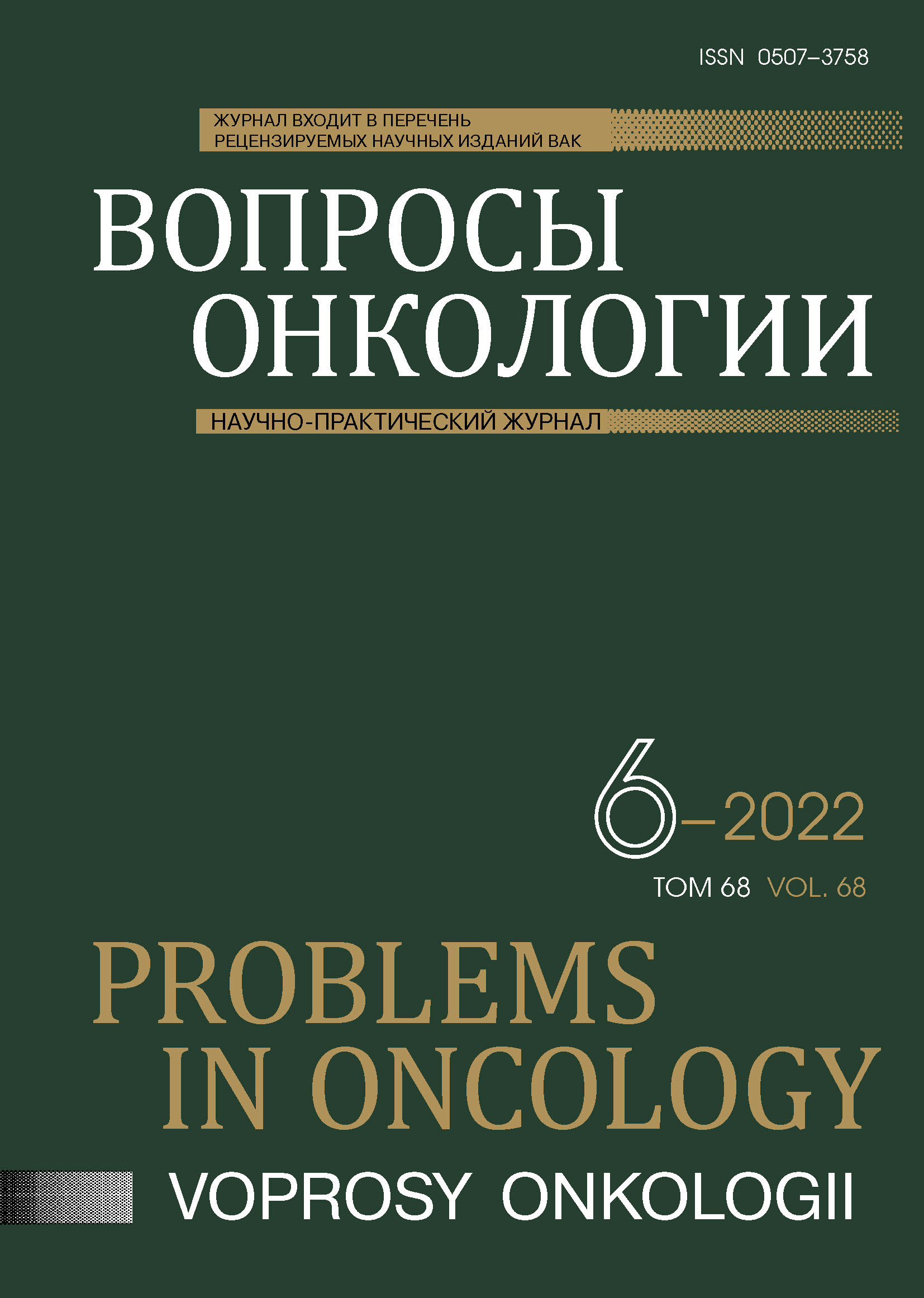Abstract
Concept of regional impact on tumor cells, based on the delivery of high doses of a chemotherapeutic drug with an acceptable level of systemic toxicity directly into the peritoneum, is thought to be a promising strategy for prevention and treatment of peritoneal carcinomatosis.
Intra-abdominal pressurized aerosol chemotherapy (PIPAC — Pressurized Intraperitoneal Aerosol Chemotherapy) is a new technology for delivering a chemotherapy drug to the peritoneum for prophylactic purposes in case of advanced gastric cancer, the efficacy and safety of which has not yet been confirmed in randomized clinical trials.
Materials and methods. The clinical trial protocol GASPACCO (Oncological Benefits of PIPAC in Patients With T3-4 Gastric Cancer Cyt-), initiated by First Pavlov State Medical University of St. Petersburg has been presented. The clinical trial has been registered on the ClinicalTrials.gov portal under NCT04595929 number.
The study design: a single-center, prospective, randomized clinical trial evaluating the benefits of the intraoperative intraperitoneal aerosol chemotherapy (PIPAC) method in the course of the complex treatment of locally advanced T3–4 gastric cancer and/or with regional lymph nodes affected without distant metastases and negative cytology from peritoneal lavage (cyt-), as compared to standard treatment.
Primary endpoint of the study is overall survival (during the follow-up). Secondary endpoints of the study are recurrence-free survival, incidence of peritoneal carcinomatosis, incidence of serious adverse events, quality of the patients’ life during the postoperative period (EORTC QLQ-C30), intensity of pain syndrome, postoperative mortality and complications.
Materials and methods. Randomization 1:1 for inclusion of 152 patients in each of two arms: the PIPAC group of the active comparison (4 cycles of neoadjuvant chemotherapy FLOT ― gastrectomy with D2 lymph nodes dissection - PIPAC) and the active control group (neoadjuvant chemotherapy - gastrectomy with D2 lymph nodes dissection without PIPAC).
Results and discussion. In order to assess the benefits of using the PIPAC method in the course of complex treatment of locally advanced cancer, as compared to standard treatment, 304 patients with locally advanced gastric cancer are planned to be included in the GASPACCO clinical trial.
References
Moraga-Serrano PE. Global, regional, and national cancer incidence, mortality, years of life lost, years lived with disability, and disability-adjusted life-years for 29 cancer groups, 1990 to 2016: a systematic analysis for the global burden of disease study // JAMA Oncol. 2018.
Glehen O, Gilly FN, Arvieux C et al. Association Française de Chirurgie. Peritoneal carcinomatosis from gastric cancer: a multi-institutional study of 159 patients treated by cytoreductive surgery combined with perioperative intraperitoneal chemotherapy // Ann Surg Oncol. 2010;17(9):2370–7. doi:10.1245/s10434-010-1039-7.
Lee JH, Kim JG, Jung HK et al. Clinical practice guidelines for gastric cancer in Korea: an evidence-based approach // J Gastric Cancer. 2014;14(2):87–104.
Rau B, Brandl A, Piso P et al. Peritoneal metastasis in gastric cancer: results from the German database // Gastric Cancer. 2020;23(1):11–22.
Fujitani, Kazumasa et al. Gastrectomy plus chemotherapy versus chemotherapy alone for advanced gastric cancer with a single non-curable factor (REGATTA): a phase 3, randomised controlled trial // The Lancet Oncology. 2016;17(3):309–318.
Kok HP et al. Heating technology for malignant tumors: A review // International Journal of Hyperthermia. 2020;37(1):711–741.
Zhuang Xuhui, He Yuewen, Ma Wuhua. Prophylactic hyperthermic intraperitoneal chemotherapy may benefit the long-term survival of patients after radical gastric cancer surgery // Scientific Reports. 2022;12:2583. doi:10.1038/s41598-022-06417-y
Zhang JF, Lv L, Zhao S et al. Hyperthermic Intraperitoneal Chemotherapy (HIPEC) Combined with Surgery: A 12-Year Meta-Analysis of this Promising Treatment Strategy for Advanced Gastric Cancer at Different Stages // Ann Surg Oncol. 2022;29:3170–3186.
Girardot-Miglierina, Arnaud, Clerc, Daniel, Alyami, Mohammad, Villeneuve, Laurent, Sgarbura, Olivia, Reymond, Marc-André, Hübner, Martin and on behalf of the ISSPP PIPAC study group. Consensus statement on safety measures for pressurized intraperitoneal aerosol chemotherapy // Pleura and Peritoneum. 2021;6(4):139–149.
URL: https://clinicaltrials.gov/ct2/show/NCT04595929
Бесова Н.С., Калинин А.Е., Неред С.Н. и др. Рак желудка: клинические рекомендации. Министерство здравоохранения Российской Федерации. Общероссийский национальный союз «Ассоциация онкологов России», Общероссийская общественная организация «Российское общество клинической онкологии». 2020. URL:https://oncology-association.ru/wp-content/uploads/2020/09/rak_zheludka [Besova NS, Kalinin AE, Nered SN et al. Gastric cancer. Clinical recommendations. The Ministry of Health of the Russian Federation. The All-Russian National Union «Association of Russian oncologists», the All-Russian Social Action Organization «Russian Community of Clinical Oncology». 2020 (In Russ.)]. URL:https://oncology-association.ru/wp-content/uploads/2020/09/rak_zheludka
Бесова Н.С., Трякин А.А., Артамонова Е.В и др. Практические рекомендации по лекарственному лечению рака желудка // Злокачественные опухоли: Практические рекомендации RUSSCO #3s2. 2021;11:21 [Besova NS, Tryakin AA, Artamonova EV et al. Practical Recommendations on Drug Treatment for Gastric Cancer // Malignant tumors: Practical Recommendations RUSSCO #3s2. 2021;11:21 (In Russ.)].
Nadiradze G, Giger-Pabst U, Zieren J et al. Pressurized Intraperitoneal Aerosol Chemotherapy (PIPAC) with low-dose cisplatin and doxorubicin in gastric peritoneal metastasis // J Gastrointest Surg. 2016;20:367–73. doi:10.1007/s11605-015-2995-9
Sun J, Song Y, Wang Z et al. Benefits of hyperthermic intraperitoneal chemotherapy for patients with serosal invasion in gastric cancer: a meta-analysis of the randomized controlled trials // BMC Cancer. 2012;12(1):526.
Wagner AD, Syn NL, Moehler M et al. Chemotherapy for advanced gastric cancer // Cochrane Database Syst Rev. 2017;8(8):CD004064.
Desiderio J, Chao J, Melstrom L et al. The 30-year experience – a meta-analysis of randomised and high-quality non-randomised studies of hyperthermic intraperitoneal chemotherapy in the treatment of gastric cancer // Eur J Cancer. 2017;79:1–14.
Khomyakov V, Ryabov A, Ivanov A et al. Bidirectional chemotherapy in gastric cancer with peritoneal metastasis combining intravenous XELOX with intraperitoneal chemotherapy with low‐dose cisplatin and doxorubicin administered as a pressurized aerosol: an open‐label, phase‐2 study (PIPAC‐GA2) // Pleura Peritoneum. 2016;1:159–166.
Solass W., Kerb R., Muerdter T et al. Reymond Intraperitoneal chemotherapy of peritoneal carcinomatosis using pressurized aerosol as an alternative to liquid solution: first evidence for efficacy // Ann. Surg. Oncol. 2014;21(2):553–559.

This work is licensed under a Creative Commons Attribution-NonCommercial-NoDerivatives 4.0 International License.
© АННМО «Вопросы онкологии», Copyright (c) 2022
